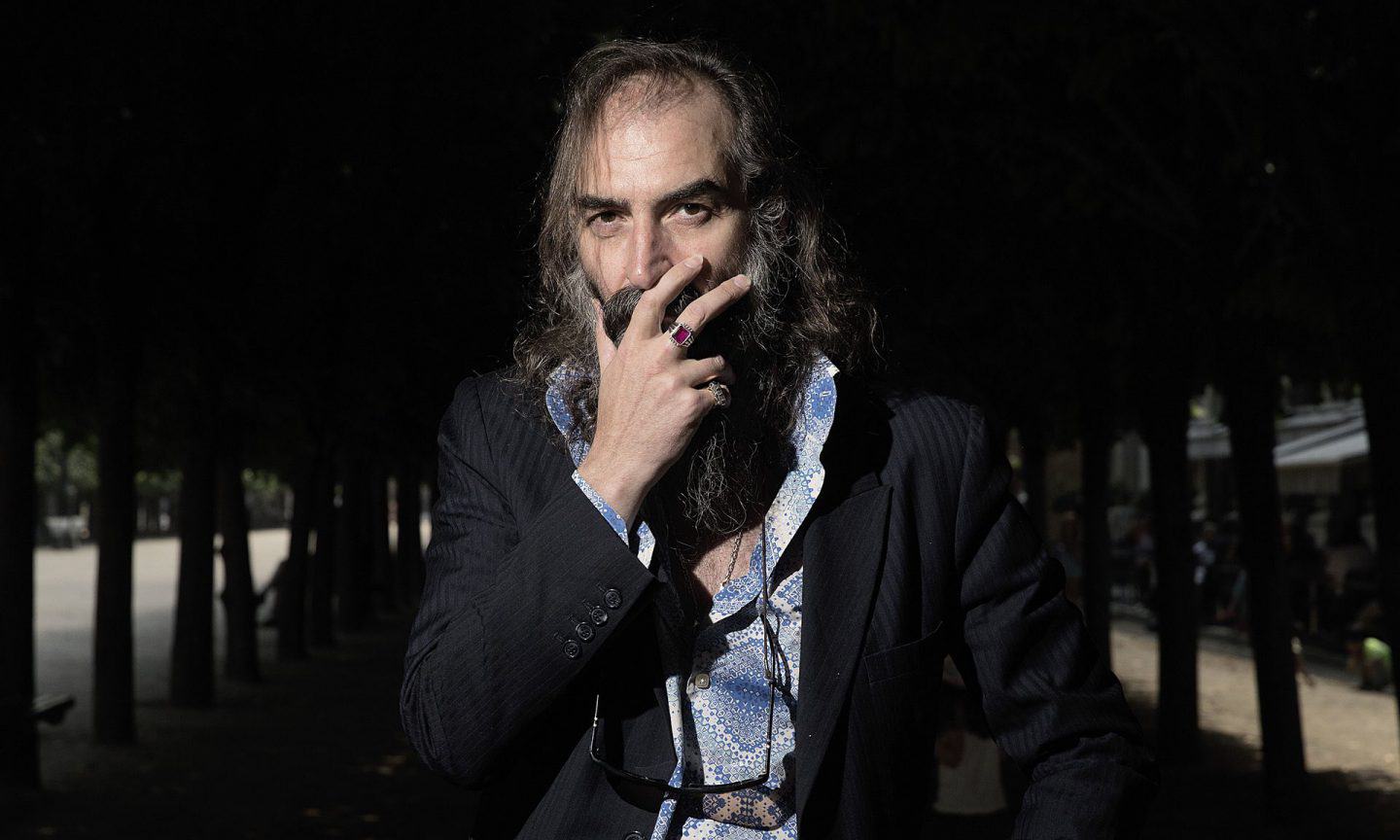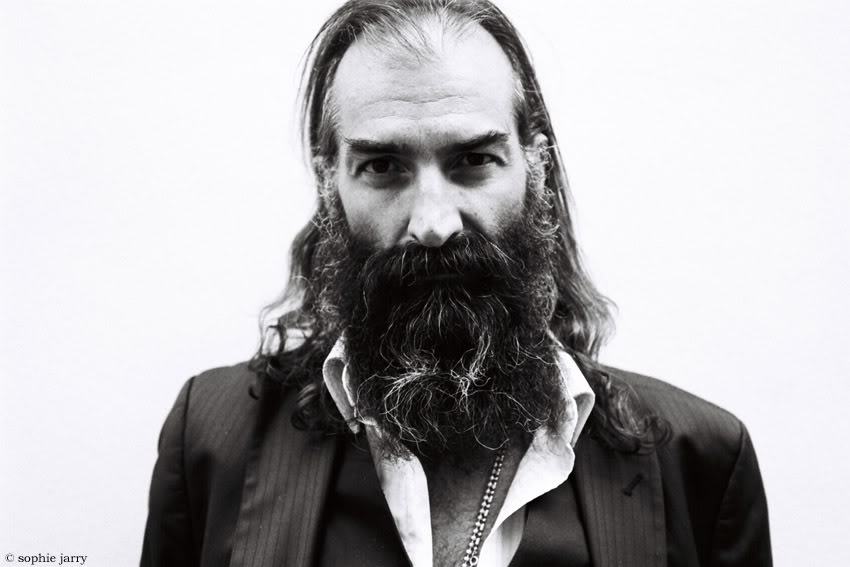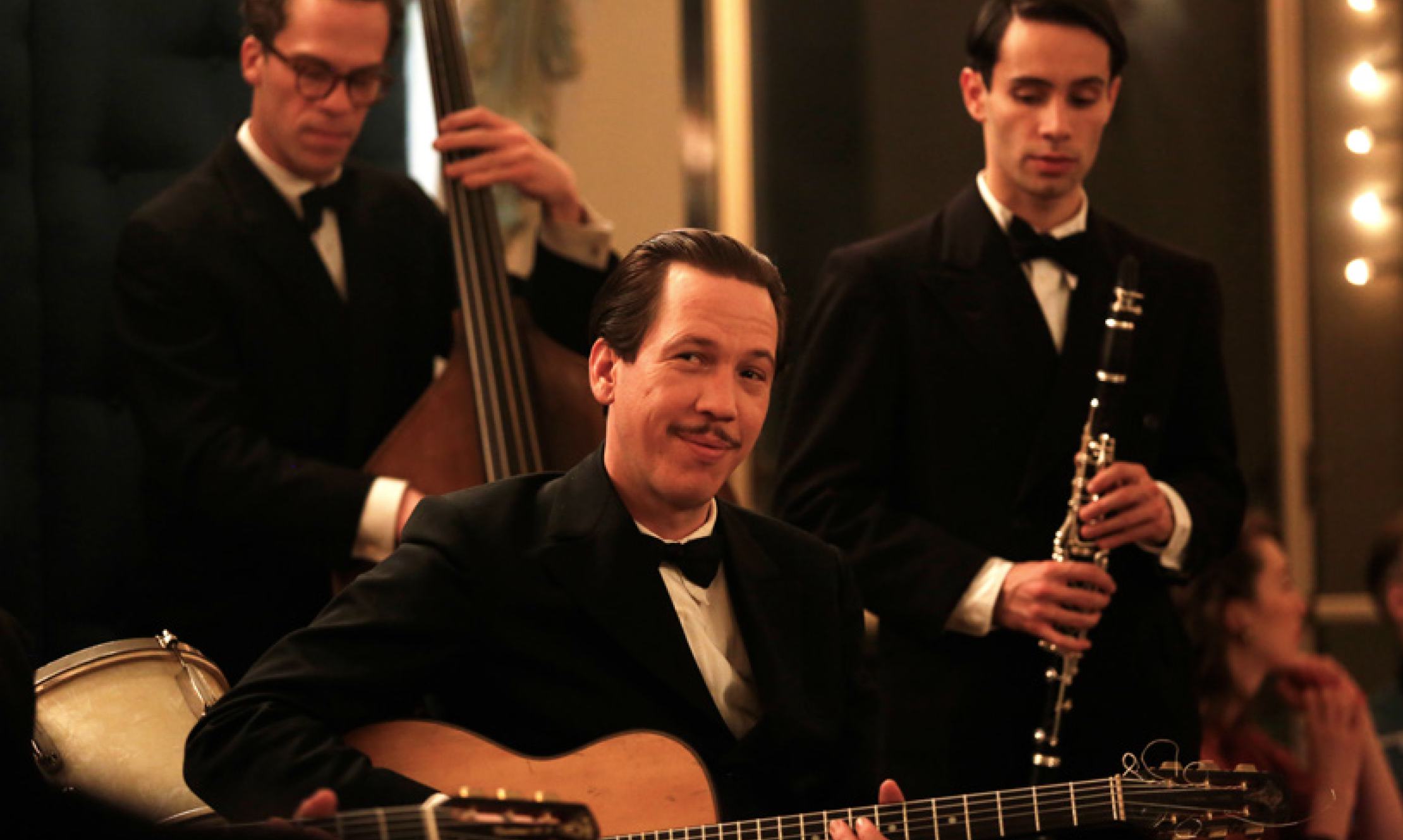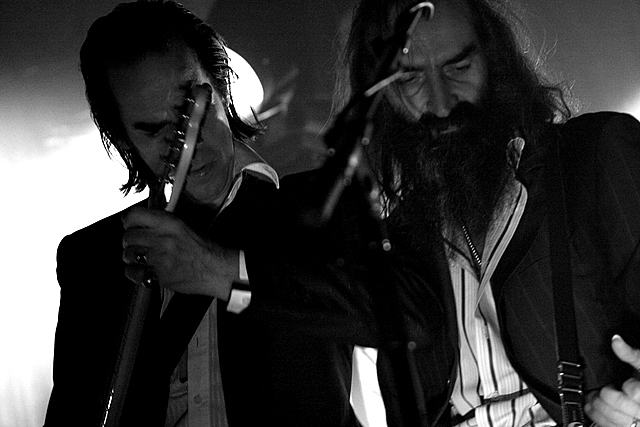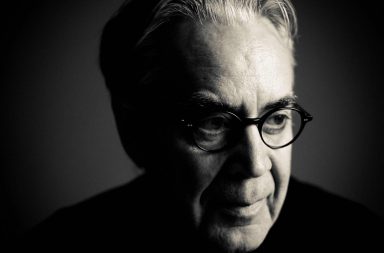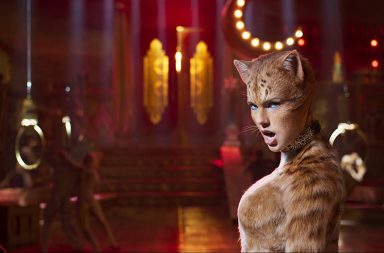With his long hair, thick beard, jewelry and dandy clothes, Warren Ellis is not your typical film composer. Once a teacher, then a busker, the classically trained violinist and brilliant multi-instrumentalist now splits his time between his solo career as a musician and film composer, and his collaborations with a plethora of stellar artists and bands such as Cat Power, Marianne Faithful, Nick Cave and the Bad Seeds, Dirty Three and Grinderman.
Hailing from Ballarat, Victoria (Australia), Ellis has composed scores for The Assassination of Jesse James by the Coward Robert Ford (Andrew Dominik, 2007), Far From Men (David Oelhoffen, 2014), or more recently Hell or High Water (David Mackenzie, 2016) with his longtime accomplice Nick Cave. With Deniz Gamze Ergüven’s Mustang, his first cinema solowork, he has won a César Award for Best Original Music last year.
On the occasion of the release of Étienne Comar’s Django, his second solo scoring project, the Paris-based musician provided Score It Magazine with an inside look at his diverse career. Being both affable and refreshingly relaxed, we had the chance to speak with Ellis, from the humble beginnings of his career as a professional musician to his recent work on Etienne Comar’s highly anticipated faux-biopic on the life of iconic gipsy-jazz musician Django Reinhardt during the Second World War. In 1943 occupied Paris, the guitarist is on the top of his art whilst his gipsy brothers are being persecuted all around Europe. Played by French actor Reda Kateb, Django is torn between his career as a musician and the harsh realities of Nazi’s oppression.
Score It: To start off, could you please tell us how much of an influence Django Reinhardt was on yourself as a musician? Or Gypsy music more generally?
Warren Ellis: I was certainly aware of him as a guitar player and as a really ferocious musician because of his inspiring ability to overcome the disfigurement of his hand, which probably made him become an even greater musician than he may have been otherwise. What seems incredible was that amazing capability to overcome a tragedy. Technically, Django was such an extraordinary and lyrical player. I was very aware of Stéphane Grappelli, and I really like his violin playing. I guess their music didn’t feature very heavily on my radar because there was something about it that seemed very foreign and not of the world that I was engaging with, particularly when I was younger. It’s probably not the sort of music I’d ever put on very much at home.
With regard to the Gypsy theme, I’ve always really liked both folk music and the idea of folk music, that it’s made by people for people. There’s something incredibly human about it. I think folk music has always featured quite heavily in the music I listen to. When I was 21, I left Australia in 1988 and went on a trip to Europe for the first time. I didn’t really know what to do with my life, but I had a violin and I started playing in the streets as a way of making some money, since I didn’t have much of it. I started busking and ended up being thrown into this world that I wouldn’t otherwise have been thrown into, if it hadn’t have been for that. I was learning Irish and Scottish music from various people, travelling around and playing, so that certainly had an influence on me.
How did you end up scoring for Django? Was it through Reda Kateb, whose short film you scored (Pitchoune, 2015)?
What happened was: I had initially scored a film he was in called Far From Men (Loin des hommes, 2014), and that’s how Reda and I first met. I have a studio in the garden, in the shed that I’ve been working from for the last seven or eight years now. It’s where I get all my ideas together for the scores. Reda asked me to do the music for his short film, called Pitchoune, and he was in my house with me, doing the score together. At the same time, I had just refused to do a film called Mustang by Deniz Gamze. I said I couldn’t do it because I just didn’t have enough time, since there were only ten days to do it and I had to go on tour with Nick Cave, doing a solo show.
I was actually upset about it. I was talking to Reda about it, and he said to me, “You can’t do everything. It’s better to say no, and do what you can do well”. And I said, “I just feel bad because it looks really good”, and he said, “Well, I always try to do a director’s first film, because there’s an energy in it that you don’t find in a second film to come after that”. When he said that, the penny dropped. That was exactly what I felt with Mustang. He then said, “I’m doing this director’s debut film on Django Reinhardt, I’m going to play Django and I’m not doing any other films. I’m learning to play the guitar, and I’ve never played it before. The challenge and the energy of this film is really fascinating to me.”
After spending that afternoon with Reda, I then called Deniz back saying that I would try and do Mustang. I also ended up getting a call from Etienne asking if I’d do Django, so Reda is connected to both those films and my decision to do them, in an odd way.
This faux-biopic is doubly unusual, as it is not a life-spanning narrative, and it highlights the little-known part of Nazi horror: the genocidal round-up of the Romany people. Did you know much about Reinhardt’s life before working on this film?
No I didn’t. I mean, I knew the story of Django being in a fire and going to England on tour. Stéphane Grappelli got sick, Django came back and got stuck in Paris during the war and the occupation. But I didn’t know anything about him writing a Mass or much about his life. I found the fact that he had written this piece that was lost really fascinating; it seemed extraordinary that they managed to lose something like that. When Etienne approached me about doing the score for Django, it seemed like a really unique thing to do. And particularly, regarding composing the rest of the Mass, I had never written songs for a pipe organ and orchestra to be sang in Romany. It was actually the first song I’ve ever written with a tune, lyrics and accompaniment. That was kind of challenging.
The film doesn’t ever portray Django as an active resister nor as a collaborationist, but more as an ordinary man, who happens to be an immensely gifted artist, caught up in the torments of a war. In your opinion, what is the role of an artist regarding political or geopolitical upheaval?
I’m not really sure. I don’t consider myself a political artist: I don’t see my art that I create as something that comments on a political position, makes political observations or reacts to things. I have never sat down to write a piece that would even be relatively inspired by anything like that at all. When times are difficult, I guess people create art as a way of dealing with it or maybe as a way of overcoming it. Nonetheless, I’ve lived in a very lazy, spoilt, middle-class existence. I don’t know what it’s like to live under a regime that is barbarous or squashing the life out of everybody.
The things that I’ve had to deal with in my life are probably particularly insignificant. I’m interested in the politics of people to a point, but I’m actually more interested in just making music and the evolution of that. I’ve been as a visitor to the West Bank, I’ve been to Belfast and Dublin when the Troubles were on, but I have no connection. My life has never been about that. I just come from a middle class/working class family in Australia. I’m a guy who works in a band, you know.
How did you work with the Rosenberg Trio?
I actually didn’t work with them at all. They replayed the Django Reinhardt music and I met them in the studio. Etienne gave me the forty seconds of Django’s Mass that had been recorded somewhere, and I used that as a launch pad for my ideas on how it might be.
There are very two different kinds of music going on in the film: there’s Django’s music that everybody knows, and then there are one or two little references to the Mass (little demos that were put in the film, to give the hint that something was coming up) and then the Mass itself. The Rosenberg Trio don’t play on that, I actually had nothing to do with their side of the film.
Can you tell us more about your creative process when working on ‘Lacrimosa Song’? You apparently only had an organ introduction. How did you find the inspiration to compose the rest of this mesmerizing piece?
I think I took very little from the introduction, because it seemed to be a language and style of music that I didn’t understand and that I had no relationship to. So, I listened to it a few times, and then I just actually sat down and I had an idea for a melody. I was waiting for a car to arrive, and I switched on my iPhone and I recorded a tune that I had played on the piano. Then I sent it to Etienne, but he said he wasn’t not sure he understood it. So I got him to come round to my house and I played it to him on the piano. There were a couple of things he still wanted to hear: some movement, for instance. Then, I sat down with an arranger, and they helped bring the idea into a more classical world.
For me, I knew the kind of piece that I was trying to create. When I approach film music, I don’t really look at the images, my ideas start away from the images. Because I find that the music tends to have natural accidents with how it falls in with the images, which seem so much more magical and mysterious than when everything lands on the cut. So, my aim is to write a piece of music that can hold up to listening, rather than to write a piece of something that just sits under the scene. I knew this was a Requiem Mass, and I also knew that it was meant to sound like a folk tune in a way, easy for people to sing, not something high-brow. I approached it from there. The visual idea came very fast while I was waiting for a car, and I sort of reported it, played it a few times and then recorded it. I found the form very quickly, and I found the orchestral phrases quite fast (I’m talking within the space of 20 minutes). Then, the arranger worked quite a lot to bring it more into a world where it may have come from. It had to be recorded with an organist and string players with timing. Timing and tuning are things which are very far from my world.
With what I’ve done in the past using strings for scores, I’d first do the arrangements, then I’d play along and make them up, then I’d record them and finally get somebody in to sort them out and add things. But I don’t sit down in the traditional way and score things. When Nick and I do scores, we just sit, play and make music. Then, we watch the film and try to start refining things and finding the points and the music that start to work. This piece of music (the Requiem) had a new ‘what it needs to be like’.
In a lot of films that I write music for, I usually try to find a part of the sound that might be a voice for the film and what its textures might be. For the Requiem, I had a clear map of what it was meant to sound like. The colours of this one were very specific: I knew it was with an organ, strings and voice. I knew it wasn’t going to be happy and that it had to have a certain weight to it. It was very challenging and also thrilling for me to do something like this. Some of the scores I’ve done, like in the Assassination of Jesse James: ‘Song for Bob’, there are certain cues which have a weight and a resonance to them, and a certain soul. But to write a Requiem is a very specific thing. It’s a really awesome thing to do.
It was very effective and moving in the film.
Well, I knew that the piece was going to come at the end of the film, but it wasn’t until I saw the film that I realised the weight that was hanging on that. If the piece wasn’t convincing, then that could have really been on the nose. The problem was that I had to write the music before the film was shot. Etienne needed a working demo of the piece for December, when they were shooting that last scene. If the piece didn’t work, it was too late. He needed the music before shooting the film. I didn’t realise the weight of that until I actually watched it.
How did you apprehend the responsibility of completing the lost Requiem which was so highly symbolic in representing a tragedy experienced by the Romany people?
I certainly took it very seriously. But I didn’t think about it too much, because when you do that, it seems to stop the flight of things. I wanted to write a piece of music. In my life I have written music that is moving, so I hoped that I could write a piece that was moving and also had a certain dignity about it. I didn’t want to write something that was gratuitously emotional. It speaks about a very specific event that happened. It was enormous, actually. That can become overwhelming; I had to remove myself from that to do it. I just wanted to write something that was dignified, noble and moving, without being gratuitously button-pushing.
In addition, I was aware that this is quite a significant piece of music for the people who care about Django Reinhardt because it’s a mythical piece of music and no-one knows what it sounds like. I think it’s like that with anything: if you get overwhelmed with the situation, you’re destined to have problems.
For me, the best feedback I had was when the director told me that some of Django’s relatives had watched the film, and that they found the Mass very moving and really enjoyed it. I was really happy that his family seemed to give it the thumbs-up.
As we’ve said earlier, you’ve scored Reda Kateb’s directing-debut short-film and you first met when whilst making Loin des hommes (2014), directed by David Oelhoffen. In a 2015 Telerama interview you said Reda was one of your favorite living actors. Can you tell us more about your relationship with him?
Funnily enough, when Reda came round to work on his short film he told me that he grew up in the street that runs parallel to the street I live on. He grew up in the suburbs of Paris, and he worked in the cinema that I go to around the corner as a projectionist. It was a funny coincidence that he actually grew up around the corner. I didn’t know him then, and he had moved out by the time I moved in.
I remember seeing Reda in Engrenage and I thought he was amazing in that film. I love the bad guy he plays. He is so terrifying. I also saw him in A Prophet (Jacques Audiard, 2008). He seems to be very versatile in the roles he can do, particularly when he plays the bad guy, which is worrying! He’s a really great actor.
You’re working on Gauguin, a film by Edouard Deluc with Vincent Cassel acting as the iconic French painter, to be released in September. Can you tell us about your score for this film and about any future projects as a film score composer?
I have just finished Gauguin. It’s very much a violin affair. I did it on my own, and I play everything: the piano, the strings etc., but it does feature the violin and the flute quite a lot. It’s very violin-driven and lyrical. With that, it was nice to find a voice for the film.
Also, I have just finished the score for Wind River with Nick Cave, which is the third film in the trilogy by screenwriter Taylor Sheridan who wrote Sicario (Denis Villeneuve, 2015) and Hell or High Water (David Mackenzie, 2016). (Ed: Wind River is Taylor Sheridan’s directorial debut and is nominated for ‘Un Certain Regard’ category at Cannes Festival this year.)
Nick and I also did the score for David Michôd’s War Machine, which is an interesting Netflix movie with Brad Pitt in it, coming out very soon (Ed: available on May 26 on Netflix). I am also in the process of doing Deniz’s second film at the moment, with Nick as well. We’re trying to do different styles of film too, which is really good. I did a teenage drama called Bad Girl (Fin Edquist, 2016) that’s coming out in April, which I recorded on tour with Dirty Three, doing a score in the hotel room and then mixing it in the plane on the way home from Australia to Paris. I wanted to see if I could do an economical score, done in a very brutal and different fashion to what I had been working on.
The film Mustang really inspired me, because I had six or seven days to do the score, and I had never done that sort of thing on my own. I just sat in the shed and did it. It gave me this lease of energy to try and push myself to do things in a different way to how I had been doing them, taking away the safety belt.
For a little while, particularly concerning the scores Nick and I were doing, we just seemed to be doing Westerns and films with people getting lost in landscapes. We did a National Geographic miniseries, Mars, which was really good, for. We did some documentaries too. We’re always on the lookout for different kinds of scores to do.
The thing is, with making music for films, I might be responsible for this too, but there is a lot of film music that seems like wallpaper. Like so many things, it’s been kind of watered down. There are a lot of bad wallpapers out there, which are just thrown on films for one reason or another. You always remember when music is bad in a film. But, when it’s really great, with something like Under The Skin (Jonathan Glazer, 2013) you see that and think, “Wow, that’s how great it can be.” You see that fabulous collision that takes place between image and music. It’s really extraordinary.
I play in big concerts and things like that. For me, making scores is something I enjoy doing and very much do for the pleasure of it. But scoring films is certainly not my job, and if it was, I certainly wouldn’t enjoy doing it at all. I wouldn’t like to feel that I’m doing a certain amount of films every year to pay the mortgage. I like being able to decide if I want to do something or not, based on the merits of the project.
Certainly, I think the way I approach films is not for everybody. There are lots of directors and producers who can’t deal with that approach. They would rather have a clear-cut approach, which is quite understandable. So, in a way, that’s quite good because then you only work with people who prepared to come around to your way of working. They have to really like what you do. I’ve definitely been in situations where people have been in a shock when they didn’t know what they were getting themselves in for. For me, writing scores has been about the actual pleasure of making the music as opposed to an, “Oh, here’s another film” kind of mindset.
Interview prepared and edited by Marine Wong Kwok Chuen.
Conducted, transcribed and edited by Amalia Morris, Sylvain Pinot.
